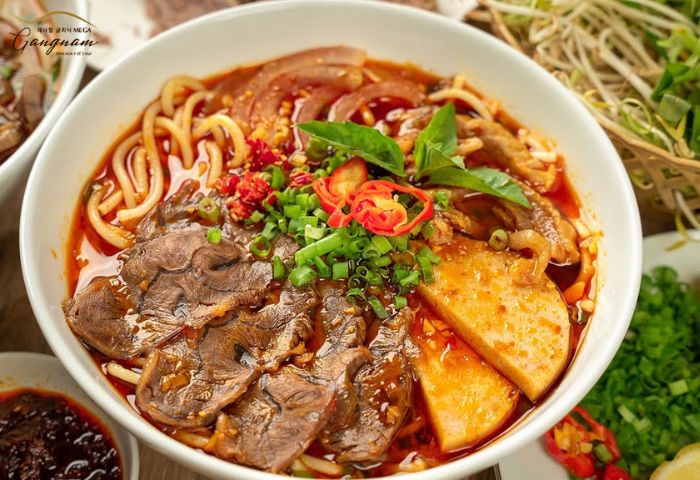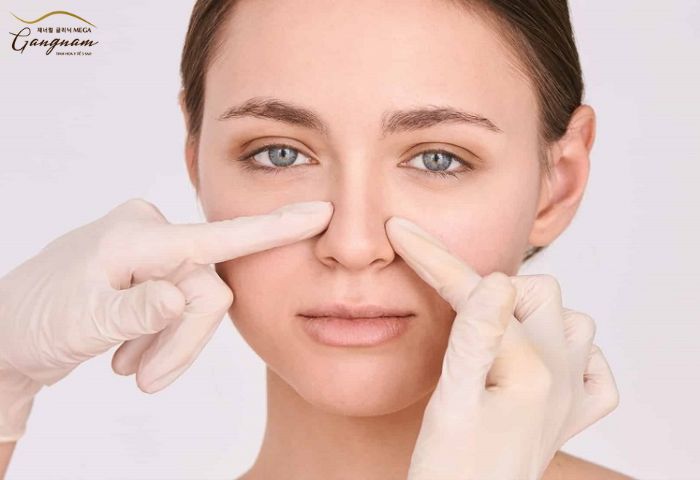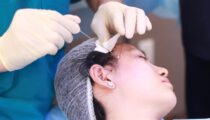How long after rhinoplasty can you eat beef noodle soup?
“Rhinoplasty is one of the popular cosmetic procedures chosen by many to enhance the nose’s shape and improve facial aesthetics. However, after undergoing rhinoplasty, it’s essential to pay attention to your diet to support the recovery process and protect the surgical results. So, how long after rhinoplasty can you eat beef noodle soup? This is a common question for many individuals post-rhinoplasty. In this article, Mega Gangnam will address this question with the guidance of reputable cosmetic experts.
Can you eat beef noodle soup after rhinoplasty?
According to leading nutrition experts, in 100 grams of rice noodles, there are approximately 107 – 130 kcal, providing essential nutrients such as protein, calcium, iron, magnesium, phosphorus, water, and fiber.

Can you eat beef noodle soup after rhinoplasty?
Although rice noodles contain many essential nutrients for the body, some people wonder if they can eat rice noodles after rhinoplasty. This is an important issue, especially considering that rice noodles are a popular dish.
In fact, eating rice noodles after rhinoplasty not only depends on the type of food you choose but also on how you combine them with other foods. Dishes like beef noodle soup, crab noodle soup, fish ball noodle soup, snail noodle soup, shrimp noodle soup, fermented shrimp paste vermicelli, and many others can affect the healing process after nose surgery.
Therefore, individuals who have undergone rhinoplasty are often advised to avoid seafood, foods with a strong odor, and beef after surgery to ensure the best recovery for the nose.
How long after rhinoplasty can you eat beef noodle soup?
After a rhinoplasty procedure, you can resume eating beef as usual after a certain period. Experts have clarified that avoiding beef, beef tendons, beef tripe, and similar foods is not mandatory after rhinoplasty.
However, it is essential to ensure a smooth recovery process, especially for individuals with sensitive constitutions that may lead to pain or dark scars. Experts recommend abstaining from beef for at least 1 to 2 months after rhinoplasty.
The duration of abstaining from beef may vary depending on individual cases and each person’s recovery capacity. Therefore, it’s advisable to discuss with your plastic surgeon regarding the period of refraining from beef during the post-rhinoplasty follow-up appointments to determine the most suitable schedule.

How long after rhinoplasty can you eat beef noodle soup?
Important considerations if you want to eat beef after a nose lift
Firstly, don’t overly worry about eating beef after a rhinoplasty, as it won’t always cause scarring. For individuals with a normal constitution who consume a moderate amount of beef, the impact on cosmetic results is not overly significant.
In case you have a sensitive constitution or consume excessive beef after a nose lift, there’s no need for excessive concern. You can still maintain normal activities and adhere to postoperative care instructions from experts.
Always monitor signs like itching, swelling, or discharge at the surgical site. If there are any abnormal indications, contact your plastic surgeon immediately for advice and timely treatment.
In addition to being concerned about eating beef after a nose lift, to ensure rapid wound healing and avoid ugly scars, you should also follow these guidelines:
Adjust your diet sensibly
To promote wound healing after rhinoplasty, adjust your diet sensibly. In addition to supplementing with foods rich in vitamins C and A, as well as watery foods such as potatoes, carrots, broccoli, and green cabbage to aid in rapid wound healing, avoid foods that can stimulate scar formation and delay the healing process. Limit the consumption of spinach, sticky rice, spicy foods, and stimulants.
Adhere to the doctor’s instructions on wound care
Daily wound hygiene and following postoperative care procedures as guided by the expert. You may also consider using warm compresses to reduce swelling around 4-5 days after surgery. If you notice any unusual signs such as swelling, itching, or protrusion at the surgical site after some time post-rhinoplasty, promptly seek advice and follow-up with your doctor to ensure a smooth recovery process.
How to care for your nose after surgery?

How to care for your nose after surgery
According to surgeons, it’s worth noting that about 45% of the success and beauty of rhinoplasty results depend on how you care for your nose after the procedure. Here are some important principles for postoperative care to ensure you’ll have a beautiful nose:
- Avoid touching or scratching the newly operated nose area to prevent clotting or bleeding.
- Follow all instructions from your doctor regarding antibiotics, pain relievers, and scar prevention.
- Replace the bandage for your nose 24 hours after surgery.
- In the first 1-3 days post-surgery, you can apply a cold compress with a clean cloth to reduce swelling and avoid burning the skin.
- From the 4th day onward, you should apply a warm compress to the nose area to disperse bruising and reduce swelling.
- Avoid letting water come into contact with the surgical area.
- Prevent direct sunlight from directly contacting the wound.
- Do not engage in physical activity within 4 weeks after surgery; it’s best to limit exercise until the wound is fully healed.
- Adopt a suitable diet, adhering to the dietary instructions from your doctor.
- Schedule regular follow-up appointments as directed by your doctor.
- If you encounter any issues after surgery, contact your surgeon immediately for timely resolution.
Hopefully, through this article, you have found answers to questions about when you can eat beef after a nose lift and postoperative care methods. Always adhere to care instructions and dietary notes to achieve the best aesthetic results.
If you still have any concerns or want to schedule a direct consultation with a consulting doctor, do not hesitate to contact us via the hotline 093 770 6666 or click here to register for free consultation and answers.












